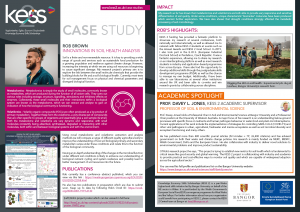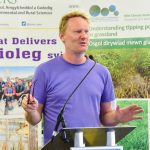
ROB BROWN
INNOVATIONS IN SOIL HEALTH ANALYSIS
Soil is a finite and non-renewable resource. It is key to providing a wide range of goods and services such as sustainable food production for a growing population and resilience against climate change. However, increasing the intensity at which we are using soil resources is beginning to cause significant damage.
My research project’s primary aim is to explore the link between the small molecule chemicals that provide the building blocks for life and a soil’s biological health. Currently, most tests for soil management focus on physical and chemical parameters and disregard biological function.
Using novel metabolomic and volatilomic extraction and analysis methods we will compare a range of different quality agricultural soils to improve the understanding of how soil biological primary and secondary metabolism varies under these conditions and relate this to the function of the biological community.
Having an in-depth understanding of the changes in the microbial function under different soil conditions is likely to enhance our understanding of biological nutrient cycling and system resilience and possibly lead to better management of soil resources into the future.
Metabolomics : Metabolomics is simply the study of small molecules, commonly known as metabolites, which are produced during the function of all active cells. They carry out various roles including storage, structure, signalling, stimulatory and inhibitory effects on enzymes. Collectively, these small molecules and their interactions within a biological system are known as the metabolome, which we can extract and analyse to gain an indication of how the biological community is functioning.
Volatilomics : Volatile organic compounds (VOCs) are often produced as a by-product of primary metabolism. Together these form the volatilome, a very diverse set of compounds that are often specific to groups of organisms and essentially give a soil sample its smell. Both the metabolome and volatilome are very dynamic and responsive; with small molecules constantly being absorbed, synthesised, degraded or interacting with other molecules, both within and between biological systems and with the environment.
IMPACT
My research so far has shown that metabolomics and volatilomics are both able to provide very responsive and sensitive differentiation of soil quality. Under some conditions, unique characteristic ‘biomarker’ molecules have been produced which warrant further exploration. We have also shown that drought conditions strongly affected the metabolic processing of soil microbiology.
ROB’S HIGHLIGHTS

KESS 2 funding has provided a fantastic platform to showcase my research at several conferences, both nationally and internationally, as well as allowed me to network with fellow KESS 2 students at events such as the Annual Awards and KESS 2 Grad School.
In 2019, I also took part in the E.I.D.S. (European Industrial Doctoral School) in Pardubice, Czech Republic. It was a fantastic experience, allowing me to share my research on an interdisciplinary platform as well as meet research students in industry and application-based programmes from across Europe.
I have also had the opportunity to develop additional skills through the postgraduate skills development programme (PSDA) as well as the chance to manage my own budget. Additionally, I have been able to use laboratories at several other institutions around the UK and been able to co-write and win research grants by collaborating across disciplines.
ACADEMIC SPOTLIGHT
Prof. Davey L. Jones
KESS 2 Academic Supervisor
Professor of Soil & Environmental Science
Prof. Davey Jones holds a Professorial Chair in Soil and Environmental Science at Bangor University and a Professorial Chair position at the University of Western Australia. A major focus of his research is on understanding below-ground processes with specific focus on nutrients and human pathogen behaviour in water-food-soil-plant-microbial systems. Current applications of his work include the implementation of strategies for controlling SARS-CoV-2 (COVID-19) and other viral pathogens in urban, agricultural, freshwater and marine ecosystems as well as soil microbial diversity and ecosystem functioning and many others.
He has published more than 480 scientific journal articles (ISI H-index = 79; 26,400 citations) and has advised government on both their waste and climate change policies. His research is mainly funded via NERC, BBSRC, Welsh Government, Defra and the European Union. He also collaborates with industry to deliver novel solutions to environmental problems and improve product sustainability.
Of Rob’s research project he says, “This project is trying to establish new metrics for soil health which is fundamental to critical issues like good security and global warming. The KESS 2 project is collaborating with industry and academia to provide practical and cost-effective ways to monitor soil quality and which are capable of widespread adoption across the agricultural sector.”
You can read his full profile and publications list on the Bangor University website:
https://www.bangor.ac.uk/natural-sciences/staff/david-jones/en
Publications
Conference abstract, which can be viewed via this link : https://meetingorganizer.copernicus.org/EGU2020/EGU2020-22358.html
“Volatile organic compounds (VOCs) allow sensitive differentiation of biological soil quality”, Soil Biology and Biochemistry journal: https://authors.elsevier.com/a/1ch0F8g13P-wK
Project Poster
Knowledge Economy Skills Scholarships (KESS 2) is a pan-Wales higher-level skills initiative led by Bangor University on behalf of the HE sector in Wales. It is part-funded by the Welsh Government’s European Social Fund (ESF) convergence programme for West Wales and the Valleys. For further information about how your organisation could benefit from participating in KESS 2, please contact the KESS 2 Central team at Bangor at: kess2@bangor.ac.uk











